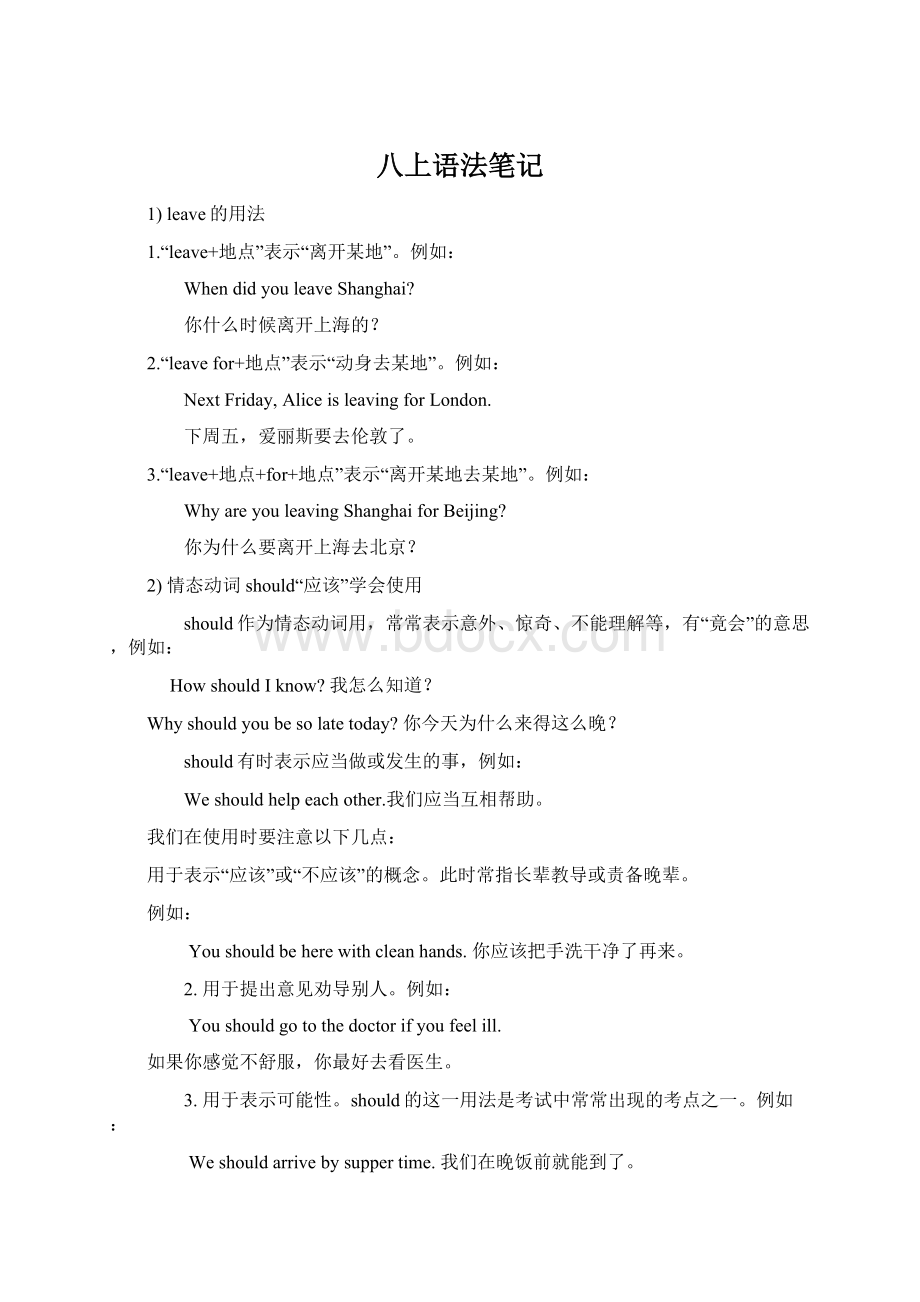八上语法笔记Word文件下载.docx
《八上语法笔记Word文件下载.docx》由会员分享,可在线阅读,更多相关《八上语法笔记Word文件下载.docx(24页珍藏版)》请在冰豆网上搜索。

职业。
如:
Whatisyourfather?
你父亲是干什么的?
该句相当于:
Whatdoesyourfatherdo?
Whatisyourfather'
sjob?
Which指代的是特定范围内的某一个人。
---WhichisPeter?
哪个是皮特?
---TheboybehindMary.玛丽背后的那个男孩。
What...?
是泛指,所指的事物没有范围的限制;
而Which...?
是特指,
所指的事物有范围的限制。
Whatcolordoyoulikebest?
(所有颜色)你最喜爱什么颜色?
Whichcolordoyoulikebest,blue,greenoryellow?
你最喜爱哪一种颜色?
(有特定的范围)
3.what与which后都可以接单、复数名词和不可数名词。
WhichpicturesarefromChina?
哪些图片来自中国?
4)频度副词的位置
1.常见的频度副词有以下这些:
always(总是,一直)
usually(通常)
often(常常,经常)
sometimes(有时候)
never(从不)
2.频度副词的位置:
a.放在连系动词、助动词或情态动词后面。
Davidisoftenarriveslateforschool.大卫上学经常迟到。
b.放在行为动词前。
Weusuallygotoschoolat7:
10everyday.
我们每天经常在7:
10去上学。
c.有些频度副词可放在句首或句尾,用来表示强调。
SometimesIwalkhome,sometimeIrideabike.
有时我步行回家,有时我骑自行车。
3.never放在句首时,主语、谓语动词要倒装。
NeverhaveIbeenthere.我从没到过那儿。
5)everyday与everyday
1.everyday 作状语,译为“每一天”。
Wegotoschoolat7:
我们每天7:
IdecidetoreadEnglisheveryday.
我决定每天读英语。
2.everyday作定语,译为“日常的”。
ShewatcheseverydayEnglishonTVafterdinner.
她晚饭后在电视上看日常英语。
What'
syoureverydayactivity?
你的日常活动是什么?
6)什么是助动词
1.协助主要动词构成谓语动词词组的词叫助动词(AuxiliaryVerb)。
被协助的
动词称作主要动词(MainVerb)。
助动词自身没有词义,不可单独使用,
Hedoesn'
tlikeEnglish. 他不喜欢英语。
(doesn'
t是助动词,无词义;
like是主要动词,有词义)
2.助动词协助主要动词完成以下功用,可以用来:
a.表示时态,例如:
Heissinging. 他在唱歌。
Hehasgotmarried. 他已结婚。
b.表示语态,例如:
HewassenttoEngland. 他被派往英国。
c.构成疑问句,例如:
Doyoulikecollegelife?
你喜欢大学生活吗?
DidyoustudyEnglishbeforeyoucamehere?
你来这儿之前学过英语吗?
d.与否定副词not合用,构成否定句,例如:
Idon'
tlikehim. 我不喜欢他。
e.加强语气,例如:
Docometothepartytomorrowevening.明天晚上一定来参加晚会。
Hedidknowthat. 他的确知道那件事。
3.最常用的助动词有:
be,have,do,shall,will,should,would
7)forgetdoing/todo与rememberdoing/todo
1.forgettodo忘记要去做某事(未做);
forgetdoing忘记做过某事(已做)
Thelightintheofficeisstillon.Heforgottoturnitoff.
办公室的灯还在亮着,它忘记关了。
(没有做关灯的动作)
Heforgotturningthelightoff.
他忘记他已经关了灯了。
(已做过关灯的动作)
Don'
tforgettocometomorrow.
别忘了明天来。
(tocome动作未做)
典型例题
----Thelightintheofficeisstillon.
----Oh,Iforgot___.
A.turningitoff B.turnitoff
C.toturnitoff D.havingturneditoff
答案:
C。
由thelightisstillon可知灯亮着,即关灯的动作没有发生,
因此用forgettodosth.而forgetdoingsth 表示灯已经关上了,而
自己忘记了这一事实。
此处不符合题意。
2.remembertodo记得去做某事(未做);
rememberdoing记得做过某事(已做)
Remembertogotothepostofficeafterschool.
记着放学后去趟邮局。
Don'
tyourememberseeingthemanbefore?
你不记得以前见过那个人吗?
8)It'
sforsb.和It'
sofsb.
1.forsb.常用于表示事物的特征特点,表示客观形式的形容词,如:
easy,hard,difficult,interesting,impossible等:
It'
sveryhardforhimtostudytwolanguages.
对他来说学两门外语是很难的。
2.ofsb的句型一般用表示人物的性格,品德,表示主观感情或态度的形容词,
good,kind,nice,clever,foolish,right。
It'
sveryniceofyoutohelpme.你来帮助我,你真是太好了。
3.for与of的辨别方法:
用介词后面的代词作主语,用介词前边的形容词作表语,造个句子。
如果道理上通顺用of,不通则用for。
Youarenice. (通顺,所以应用of)。
Heishard. (人是困难的,不通,因此应用for。
)
9)对两个句子的提问
新目标英语在命题中有将对句子划线提问这一题型取消的趋势,现在采取的作
法是对一个句子进行自由提问。
句子:
Theboyinbluehasthreepens.
提问:
1.Whohasthreepens?
2.Whichboyhasthreepens?
3.Whatdoestheboyinbluehave?
4.Howmanypensdoestheboyinbluehave?
很显然,学生多了更多的回答角度,也体现了考试的灵活性。
再如:
Heusuallygoestotheparkwithhisfriendsat8:
00onSunday.
1.Whousuallygoestotheparkwithhisfriendsat8:
00onSunday?
2.Wheredoesheusuallygowithhisfriendsat8:
3.Whatdoesheusuallydowithhisfriendsat8:
4.Withwhomdoesheusuallygototheparkat8:
5.WhattimedoesheusuallygototheparkwithhisfriendsonSunday?
6.Whendoesheusuallygototheparkwithhisfriends?
10)so、such与不定冠词的使用
1.so与不定冠词a、an连用,结构为“so+形容词+a/an+名词”。
Heissofunnyaboy.
Jimhassobigahouse.
2.such与不定冠词a、an连用,结构为“such+a/an+形容词+名词”。
Itissuchaniceday.
Thatwassuchaninterestingstory.
11)使用-ing分词的几种情况
1.在进行时态中。
HeiswatchingTVintheroom.
Theyweredancingatnineo'
clocklastnight.
2.在therebe结构中。
Thereisaboyswimmingintheriver.
3.在havefun/problems结构中。
WehavefunlearningEnglishthisterm.
Theyhadproblemsgettingtothetopofthemountain.
4.在介词后面。
Thanksforhelpingme.
Areyougoodatplayingbasketball?
5.在以下结构中:
enjoydoingsth 乐于做某事
finishdoingsth 完成做某事
feellikedoingsth想要做某事
stopdoingsth停止做某事
forgetdoingsth忘记做过某事
goondoingsth继续做某事
rememberdoingsth记得做过某事
likedoingsth喜欢做某事
keepsbdoingsth使某人一直做某事
findsbdoingsth发现某人做某事
see/hear/watchsbdoingsth
看到/听到/观看某人做某事
trydoingsth试图做某事
needdoingsth需要做某事
preferdoingsth宁愿做某事
minddoingsth介意做某事
missdoingsth错过做某事practicedoingsth练习做某 bebusydoingsth忙于做某事
can'
thelpdoingsth
禁不住做某事
12)英语中的“单数”
1.主语的第三人称单数形式,即可用“he, she, it”代替的。
he,she,it,myfriend,histeacher,ourclassroom,Tom,Mary'
suncle
2.名词有单数名词和复数名词。
man(单数)---men(复数)banana(单数)---bananas(复数)
3.动词有原形,第三人称单数形式,-ing分词,过去式,过去分词。
go---goes---going---went---gone
work---works---working---worked---worked
watch---watches---watching---watched---watched
当主语为第三人称单数的时候,谓语动词必须用相应的第三人称单数形式。
Theboywantstobeasalesassistant.
OurEnglishteacherisfromtheUS.
Theirdaughtermakesherbreakfastallbyherself.
13)名词的复数构成的几种形式
名词复数的构成可分为规则变化和不规则变化两种。
I名词复数的规则变化
1.一般在名词词尾加-s。
pear---pearshamburger---hamburgers
desk---desks tree---trees
2.以字母-s,-sh,-ch,-x结尾的名词,词尾加-es。
class---classesdish---dishes
watch---watchesbox---boxes
3.以字母-o结尾的某些名词,词尾加-es。
potato---potatoestomato---tomatoes
Negro---Negroeshero---heroes
4.以辅音字母加-y结尾的名词,将-y变为-i,再加-es。
family---familiesdictionary---dictionaries
city---citiescountry---countries
5.以字母-f或-fe结尾的名词,将-f或-fe变为-v,再加-es。
half---halvesleaf---leaves
thief---thievesknife---knives
self---selveswife---wives
life---liveswolf---wolves
shelf---shelvesloaf---loaves
但是:
scarf---scarves(fes)roof---roofs
serf---serfsgulf---gulfs
chief---chiefsproof---proofs
belief---beliefs
II名词复数的不规则变化
1.将-oo改为--ee。
foot---feettooth---teeth
2.将-man改为-men。
man---menwoman---women
policeman---policemenpostman---postmen
3.添加词尾。
child---children
4.单复数同形。
sheep---sheepdeer---deer
fish---fishpeople---people
5.表示“某国人”的单、复数变化。
即“中日瑞不变英法变,其它国把-s加后面”。
Chinese---ChineseJapanese---JapaneseSwiss---Swiss
Englishman---EnglishmenFrenchman---Frenchmen
American---AmericansAustralian---Australians
Canadian---CanadiansKorean---Koreans
Russian---RussiansIndian---Indians
6.其它。
mouse---mice
appletree---appletrees
manteacher---menteachers
14)双写最后一个字母的-ing分词
初中阶段常见的有以下这些:
1.let→letting 让
hit→hitting 打、撞
cut→cutting 切、割
get→getting 取、得到
sit→sitting 坐
forget→forgetting 忘记
put→putting 放
set→setting 设置
babysit→babysitting
临时受雇照顾婴儿
2.shop→shopping 购物
trip→tripping 绊
stop→stopping 停止
drop→dropping 放弃
3.travel→travel(l)ing 旅游
swim→swimming 游泳
run→running 跑步
dig→digging 挖、掘
begin→beginning 开始
prefer→preferring宁愿
plan→planning计划
15)肯定句变否定句及疑问句要变化的一些词
1.some变为any。
Therearesomebirdsinthetree.→Therearen'
tanybirdsinthetree.
但是,若在表示请邀请、请求的句子中,some可以不变。
Wouldyoulikesomeorangejuice?
与此相关的一些不定代词如something,somebody等也要进行相应变化。
2.and变为or。
Ihaveaknifeandaruler.→Idon'
thaveaknifeoraruler.
3.alotof(=lotsof)变为many或much。
Theyhavealotoffriends.(可数名词)→Theydon'
thavemanyfriends.
Thereislotsoforangeinthebottle.(不可数名词)
→Thereisn'
tmuchorangeinthebottle.
4.already变为yet。
Ihavebeentherealready.→Ihaven'
tbeenthereyet.
16)in与after
in与after都可以表示时间,但二者有所区别。
1.in经常用于将来时的句子中,以现在为起点,表示将来一段时间。
HewillleaveforBeijinginaweek. 一周后他会动身去北京。
2.after经常用于过去时的句子中,以过去为起点,表示过去一段时间。
HeleftforBeijingafteraweek. 一周后他动身去了北京。
不过,如果after后跟的是具体的时刻,它也可用于将来时。
Wewillfinishtheworkafterteno'
clock.十点后我们会完成工作的。
3.注意区分以下的in的用法。
I'
llvisithiminaweek. 一周后我会去拜访他。
llvisithimtwiceinaweek. 一周内我会去拜访他两次。
17)不定冠词a与an的使用
1.a用在以辅音音素开头的单词前。
Thereisa"
b"
intheword"
book"
. 单词book中有个字母b。
类